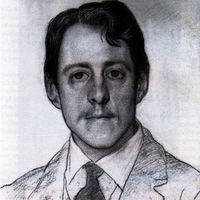Amais
I
‘O King Amasis, hail!
News from thy friend, the King Polycrates!
My oars have never rested on the seas
From Samos, nor on land my horse’s hoofs,
Till I might tell my tale.’
Sais, the sacred city, basked her roofs
And gardens whispering in the western light;
Men thronged abroad to taste the coming cool of night:
Only the palace closed
Unechoing courts, where by the lake reposed,
Wide—eyed, the enthronèd shapes of Memphian deities;
And King Amasis in the cloistered shade,
That guards them, of a giant colonnade,
Paced musing; there he pondered mysteries
That are the veils of truth;
For mid those gods of grave, ignoring smile
Large auguries he spelled,
Forgot the spears, the tumults of his youth,
And strangled Apries, and the reddened Nile.
Now turning, he beheld,
Half in a golden shadow and half touched with flame,
The white—robed stranger from the Grecian isle,
And heard pronounced his name.
II
‘Welcome from Samos, friend!
Good news, I think, thou bearest in thy mien,’
The king spoke welcoming with voice serene.
‘How is it with Polycrates, thy lord?
Peace on his name attend!
Would he were here in Egypt, and his sword
Could sheathe, and we at god—like ease discourse
Of counsel no ignoble needs enforce,
And take august regale
Of wisdom from the Powers whose purpose cannot fail.
I, too, O man of Samos, bred to war,
Passed youth, passed manhood, in a life of blood;
But many victories bring the heart no certain good.
Would that he too might tease his fate no more,
And I might see his face
In presence of my land’s ancestral Powers,—
See, from their countenance, what a grandeur beams!
Thou know’st I love thy race;
Bright wits ye have, skill in adventurous schemes;
But deeper life is ours:
Fed by these springs, your strength might bless the world. But lo!
The light begins to fade from the high towers.
Thy errand let me know.’
III
‘Thus saith Polycrates:
The counsel which thou wrotest me is well;
For, seeing how full crops my granaries swell,
How all winds waft me to prosperity,
How I gain all with ease,
And my raised banner pledges victory,
Thou didst advise me cast away what most
Brought pleasure to my eyes and seemed of rarest cost.
And after heavy thought
I chose the ring which Theodorus wrought,
My famous emerald, where young Phaethon
Shoots headlong with pale limbs through glowing air,
While green waves from beneath toss white drops to his hair.
A long time, very loth, I gazed thereon;
For this cause, thought I, men most envy me;
I took a ship, and fifty beating oars
Bore me far out to sea:
I stood upon the poop—but wherefore tell
What now is rumoured round all Asian shores?
Say only I did well,
Who the world’s envy treasured yet in deep waves drowned.
Homeward I came, and mourned within my doors
Three days, nor solace found.’
IV
Amasis without word
Listens, dark—browed: the Samian speaks anew:
‘Let not the king this thing so deeply rue;
Truly the gem was of imperial price,
Nay even, men averred,
Coveted more than wealthy satrapies,
Nor twenty talents could its loss redeem:
Yet hear! the Gods are more benignant than men dream.
Thus saith my lord: The moon
Not once had waned, when as I sat at noon
Within my palace court above the Lydian bay,
They led before me with much wondering noise
A fisherman; between two staggering boys
Slung heavily a fish he brought, that day
Caught in his bursting net,
A royal fish for royal destiny!
I marvelled; but amaze broke deeper yet
To recognize Heaven’s hand,
When from its cloven belly (surely high
In that large grace I stand)
Dazzled my eyes with light, my heart with joy, the ring
Restored!—Why rendest thou thy robe, and why
Lamentest thou, O king?’
V
‘O lamentable news!’
Amasis cried; 'now have the Gods indeed
Doom on thy head, Polycrates, decreed!
I feared already, when I heard thy joy
Must need stoop down to choose
For sacrifice, loss of a shining toy,
Searching the suburbs only of content,
Not thy heart’s home: what God this blindness on thee sent?
Gone was thy ring; yet how
Was thy soul cleared, or thou more greatly thou?
Were vain things vainer, or the dear more dear?
Hast thou, bent gazing o’er thy child asleep,
Thoughts springing, tender as new leaves? Deep, deep,
Deep as thy inmost hope, as thy most sacred fear,
Thou shouldst have sought the pain
That changes earth’s wide aspect in an hour,
Heaved by abysmal throes!
Ah, then our pleasant refuges are vain;
Yet, thrilled, the soul assembles all her power,
And cleared by peril glows,
Seeing immortal hosts arrayed upon her side!
Blind man, the scornful Gods thy offering slight:
My fears are certified.’
VI
Swift are the thoughts of fear.
But Fate at will rides swifter far; and lo!
Even as Amasis bows to boded woe,
Even as his robe, with a sad cry, he rends,
The accomplishment is here.
The sun that from the Egyptian plain descends,
Blessing with holier shade
Those strange gods dreaming throned by the vast colonnade,
Burns o’er the northern sea,
Firing the peak of Asian Mycale,
Firing a cross raised on the mountain side!
Polycrates the Fortunate hangs there:
The false Oroetes hath him in a snare;
Now with his quivering limbs his soul is crucified;
And in his last hour first
He tastes the extremity of loss; he burns
With ecstasy of thirst;
Nought recks he even of his dearest now,
Moaning for breath; no pity he discerns
On the dark Persian’s brow:
Grave on his milk—white horse, in silks of Sidon shawled,
The Satrap smiles, and on his finger turns
The all—envied emerald.

